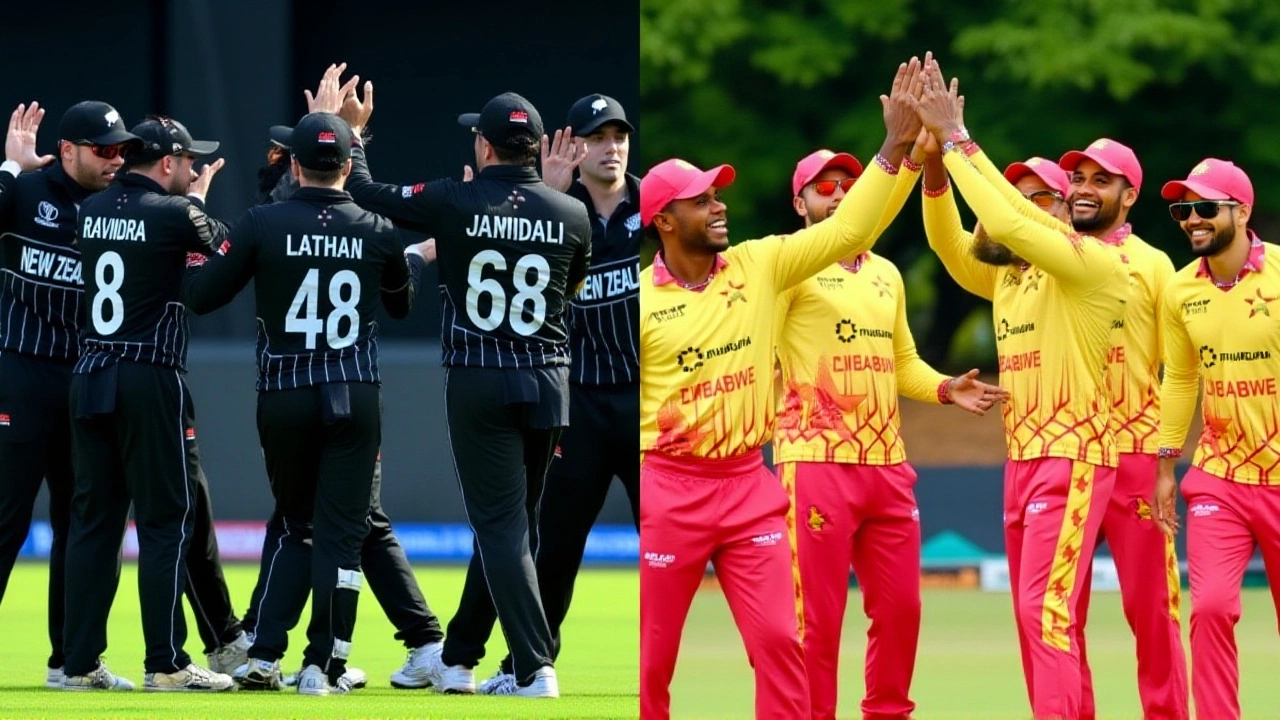Nepal shocks West Indies with historic first win over Full Member in Sharjah T20I

Nov, 16 2025
On the first T20I between Nepal and West IndiesSharjah Cricket Stadium, cricket history was rewritten. Nepal, a team that’s never beaten a Full Member of the ICC in a T20I, stunned the two-time T20 World Cup champions West Indies by 19 runs — a win so unexpected, even seasoned analysts were speechless. It wasn’t just a victory. It was a statement. And it came on a dusty desert pitch in the United Arab Emirates, where the heat was matched only by the pressure.
A Team That Refused to Bow Down
Nepal’s innings began like a house on fire — then got doused. Openers Kushal Bhurtel and captain Rohit Paudel fell inside the first three overs, leaving the team at 12 for 2. The crowd expected collapse. Instead, they got grit. Kushal Malla smashed 30 off 21 balls, then came Rohit Paudel’s masterclass: 38 off 35, with 14 boundaries and three sixes. He didn’t just score — he dictated. When he fell in the 12th over, Nepal was 68 for 2. The Cricket Association of Nepal had built this team for years. This was the payoff.
What followed was chaos — the kind only associate nations can conjure. Dipendra Singh Airee, normally a finisher, came in at 9 for 11 and somehow stayed not out. Karan KC didn’t face a single legal delivery. Yet Nepal scraped to 148 for 8. It wasn’t pretty. But it was enough. Because West Indies, with their star power and pedigree, were about to be exposed.
Holder’s Heroics Couldn’t Save the Day
Jason Holder, West Indies’ captain and one of the most respected all-rounders in modern cricket, took 4 for 20 in four overs. Four wickets. Five runs an over. That’s textbook death bowling. But even Holder couldn’t stop the tide. Because the real story wasn’t his performance — it was everyone else’s failure.
West Indies’ chase was a series of near-misses and missteps. Kyle Mayers gone in the second over. Ackeem Auguste, looking fluent, fell for 32. Then came the turning point: Navorro Bidaisee’s run-out of Keacy Carty. Airee chased down a lofted drive, lost his footing near the boundary, tumbled over the rope — then sprung back like a spring, fired a laser throw to wicketkeeper Aasif Sheikh. Carty was out by a fraction. The stadium erupted. Nepal’s bench leapt. The West Indies’ dugout went silent.
And then there was Kushal Bhurtel’s catch. The same man who got out early for 2, he returned with a moment of pure instinct. A drive to deep midwicket, a stumble, a dive, a fingertip save — he clawed the ball back from the edge of oblivion. It wasn’t just a catch. It was poetry in motion.

Why This Matters More Than the Scoreline
This wasn’t just about one match. It was about legitimacy. For decades, Full Members treated associate nations like warm-up opponents. Nepal had lost 19 of their last 20 T20Is against Full Members. They’d never won one. Now, they had. And they didn’t just win — they outplayed a team that’s won the T20 World Cup twice.
The Cricket Association of Nepal has spent the last decade investing in grassroots programs, youth academies in Kathmandu and Pokhara, and exposure tours. This win didn’t come from luck. It came from discipline. From coaches who stayed when funding dried up. From kids who practiced under streetlights because their villages had no grounds.
ESPN’s post-match analysis called it “a complete team effort.” That’s true. But it’s deeper than that. It’s about what happens when a nation with no history of global cricketing success refuses to accept its place in the hierarchy. Nepal didn’t just beat West Indies. They erased a mental barrier.
The Ripple Effect
The impact was immediate. Within hours, Nepal’s cricket federation saw a 300% spike in membership inquiries. The government announced a new funding initiative for cricket infrastructure. And the ICC? They quietly added Nepal to their “High Performance Pathway” list — a sign they’re no longer treating them as an afterthought.
And then came Monday. September 30. The second T20I. Nepal didn’t just win — they demolished West Indies by 90 runs. That’s not momentum. That’s a revolution.

What’s Next for Nepal Cricket?
The third T20I of the series was canceled due to weather, but the damage was done. Nepal’s ranking jumped from 17th to 14th — their highest ever. They’re now in contention for direct qualification to the 2026 T20 World Cup. And more importantly, they’ve shown every associate nation: if you play smart, play fearless, you don’t need a billion-dollar budget to beat the giants.
Next up? A tour of Scotland and Ireland. Then, the Asia Cup qualifiers. Nepal isn’t just participating anymore. They’re competing.
Frequently Asked Questions
How did Nepal manage to beat West Indies despite having fewer resources?
Nepal’s victory wasn’t about money — it was about mindset. They’ve invested in coaching, fitness, and mental resilience through programs funded by the Cricket Association of Nepal and diaspora donations. Players train on gravel pitches and play in local leagues that mimic international pressure. Their success stems from disciplined execution, not raw talent alone.
Who were the key players in Nepal’s historic win?
Rohit Paudel’s 38 off 35 balls anchored the innings, while Kushal Malla’s aggressive 30 off 21 provided early momentum. Dipendra Singh Airee’s fielding and late-order presence turned the tide, and Aasif Sheikh’s keeping — especially the run-out of Carty — was match-defining. Bhurtel’s catch and Gulshan Jha’s quick 11 off 8 balls added crucial momentum in the death overs.
What does this mean for Nepal’s chances in the 2026 T20 World Cup?
Nepal’s win over West Indies boosted their ICC T20I ranking to 14th — their highest ever — putting them in direct contention for World Cup qualification. With the Asia Cup qualifiers coming up and their confidence sky-high, they’re no longer underdogs. They’re contenders. The ICC has already signaled increased support, which could mean direct entry or easier qualifying paths.
Why is this win considered bigger than just a T20I victory?
For the first time, an associate nation beat a two-time T20 World Cup champion on their own terms — not by luck, but by superior strategy, composure, and execution. It shattered the myth that Full Members are untouchable. Cricket’s power structure is shifting, and this win is the clearest signal yet that the future belongs to teams who play with heart, not just budgets.
How did West Indies respond to the loss?
West Indies captain Jason Holder called it a “wake-up call” in his post-match presser, admitting his team underestimated Nepal’s aggression. The squad’s social media was flooded with messages from fans urging restructuring. Cricket West Indies has since announced a review of their T20I preparation protocols, particularly against associate nations — something they’d previously dismissed as unnecessary.
What’s the significance of the Sharjah Cricket Stadium in this context?
Sharjah has long been a neutral ground for associate nations to compete against Full Members, often serving as a battleground for legitimacy. Nepal has played 12 T20Is there since 2020, winning only two — both against lower-ranked teams. Beating West Indies there, in front of a packed crowd and under intense scrutiny, gave this win global credibility. It wasn’t a fluke on a home pitch — it happened on the world’s most contested neutral stage.